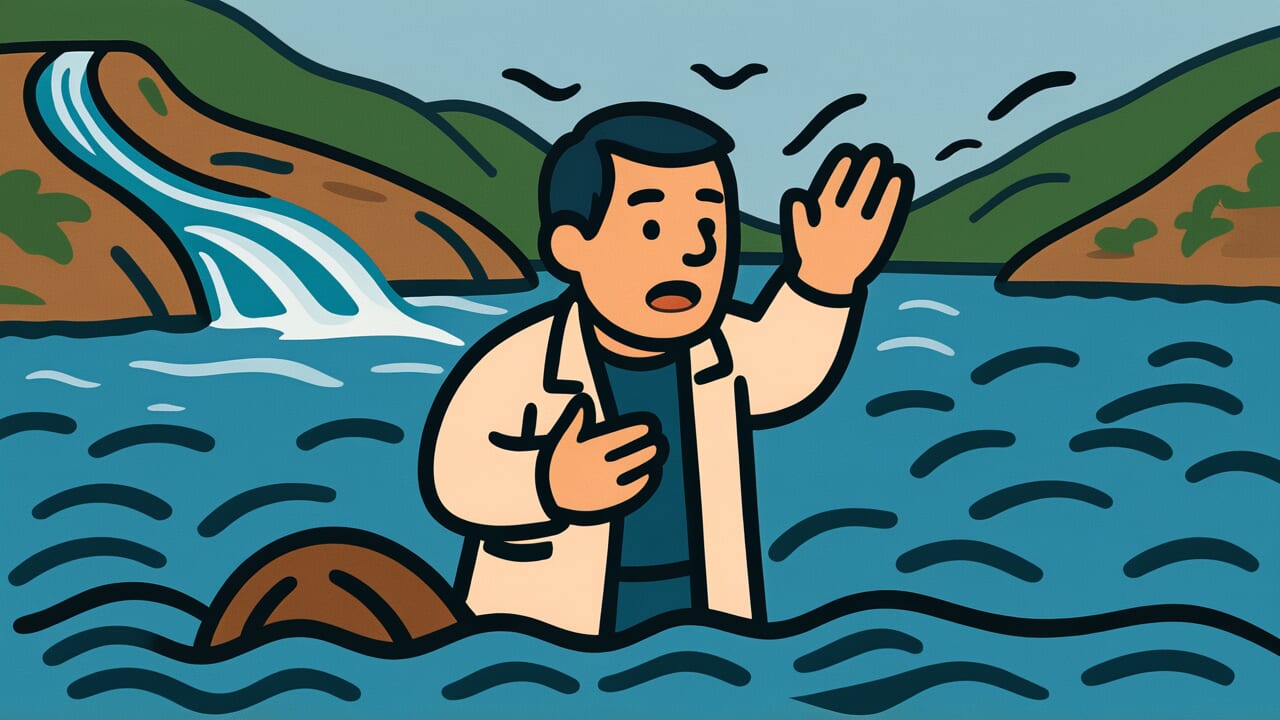How to Read “Knowing creatures, falling into the river”
namamono-shiri kawa e hamaru
Meaning of “Knowing creatures, falling into the river”
“Knowing creatures, falling into the river” is a proverb that warns against having incomplete knowledge. This half-baked understanding makes people overconfident. They act carelessly and end up failing.
When people have just a little knowledge or experience, they tend to overestimate themselves. A true expert would be careful in such situations.
But someone with partial knowledge thinks, “This much should be fine.” They let their guard down. As a result, they invite unexpected failures.
This proverb doesn’t reject knowledge itself. The problem is the half-baked state of “knowing just a little.”
If you know nothing at all, you’ll be cautious. If you truly master something, you understand the dangers.
However, knowing just a little is the most dangerous state of all.
Even today, people use this saying in various situations. Someone might try to make expert judgments based on fragmented internet knowledge.
Or they might become overconfident from limited experience. This proverb teaches us to stay humble and recognize the limits of our knowledge.
Origin and Etymology
The origin section could not be generated.
Usage Examples
- He only dabbled a bit in programming, but tried to change the entire system and caused a huge problem. That’s exactly “knowing creatures, falling into the river”
- After reading just a few investment books, he poured all his savings into one stock, just like “knowing creatures, falling into the river”
Universal Wisdom
The proverb “Knowing creatures, falling into the river” sharply points out a blind spot in human cognition. Why do people become most dangerous when they gain just a little knowledge?
The answer is that confidence and ability don’t always match up in humans. Psychology knows this as the “Dunning-Kruger effect.”
But our ancestors saw through this human trait hundreds of years ago.
In a state of ignorance, people recognize their own powerlessness. So they become careful and ask for help.
True experts, on the other hand, know the depth and complexity of their field. That’s why they stay humble.
However, people “in the middle” who “know a little” don’t know how much they don’t know.
This blind spot is a side effect of confidence, a mechanism humans developed to survive. Confidence drives action and makes challenges possible.
But when that confidence lacks real ability, it becomes arrogance. It leads to poor judgment.
This proverb has been passed down for so long because this fundamental human weakness never changes across time.
The more knowledge increases, the more you see the realm of your own ignorance. Our ancestors teach us that this humility is true wisdom.
When AI Hears This
People who’ve learned to swim a little are more likely to drown. This happens because the ability development curve isn’t a straight line.
Research on the Dunning-Kruger effect shows that human confidence levels don’t match ability growth. Rather, when knowledge increases from 10 to 20, confidence peaks.
Then as learning continues to 30, 40, people become humble, thinking “I still know nothing.”
The “knowing creatures” in this proverb refers to people at the first peak of the knowledge curve. They’ve learned river flow basics and swimming techniques.
At that stage, they think “I’m fine now.” But rivers have invisible whirlpools, physical exhaustion from water temperature, and unpredictable flooding.
True experts know these dangers. But those with half-baked knowledge “don’t even know what they don’t know.”
What’s interesting is that complete beginners with zero ability are actually cautious. Because they know nothing, they fear the river and stay away.
But once they learn a little, they can’t see the vastness of the unknown. They can’t judge what percentage their knowledge represents of the whole.
In other words, “knowing” temporarily reduces their ability to recognize danger.
This proverb points out a blind spot in human cognition. Danger level changes not by the amount of knowledge, but by the stage of knowledge.
Lessons for Today
What this proverb teaches modern people is an important truth about the attitude toward learning.
In today’s information-flooded era, we can easily “feel like we know” something. Watch one video, read one article, and we feel like we understand.
But is that really true?
What matters is becoming more humble as you learn more. People who deeply study a field often say, “There’s still so much I don’t know.”
That’s not weakness. It’s a statement that comes from knowing the breadth and depth of that field.
When you start learning something new, the stage where you “sort of get it” is most dangerous. That’s when you should stop and think.
“Do I really understand this?” “Am I missing something important?”
This habit of self-questioning leads you to true growth. Knowledge only becomes power when paired with humility.
To avoid falling into the river, you need the courage to look carefully at your own feet. And you need to honestly admit what you don’t know and ask for help.
That is true strength.



Comments